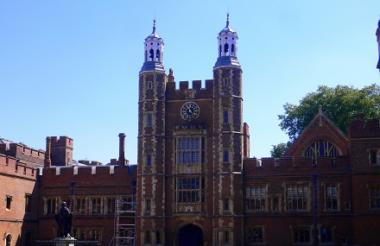The word charity might have to be reserved for organisations which are “entirely voluntary”, Nicholas Hellen, the Sunday Times’ social affairs editor, told an event at the Conservative Party Conference yesterday.
Hellen, was speaking at a fringe event about trust in charities, which was organised by the think tank Covi. He questioned whether any organisation where someone was paid should be called a charity.
He said it was a "hard sell" to believe that some organisations, like independent school Eton (pictured), should have charitable status, and also questioned whether other large organisations should have the same status.
He said issues raised by the Kids Company, Age UK and fundraising scandals were all “solvable”.
“It’s not a trust-shaped question, not a money question, it’s an Eton-shaped question,” he said.
He said the sector should view concerns about public schools as a “canary down the coal mine”.
“What I mean by that problem is defining why you deserve to be charities in the first place,” he said. “Every public school is a hard sell. You have got charitable status for a body which looks after people who are going to be much more successful than the people paying taxes.”
He added that: “Once people start asking awkward questions they will keep on unravelling.” He also questioned why medical research was considered charitable when we have big pharmaceutical firms and the NHS or why military charities exist when there is a military covenant.
Hellen said he did not have a problem with people running big organisations being paid, but the “problem is once you attach the word charity”.
He said that for the public “as long as you have that label charity that means something voluntary - pro bono” and “it doesn’t help to say that you’re efficient or you’re helping people”.
He warned that people will continue “pushing and probing”.
“You might eventually have to stick with the word charity for something entirely voluntary where nobody is in it for anything, and call the other things something different,” he said.
‘It’s about public benefit’
Responding to Hellen’s comments, Karl Wilding, director of public policy and volunteering at NCVO, said: “It’s relatively straightforward. It’s about providing public benefit and being very clear as a sector about why we are distinctive.
“We are not unique but we are distinctive. We are distinctive because we provide public benefit, we have asset locks in place, the work that we do ultimately benefits beneficiaries.
“It’s very easy to have a conversation about Eton. If you can be clear that what you do has public benefit it’s perfectly reasonable for Eton should be a charity, but if you primarily exist for private gain then Eton shouldn’t be a charity.”









